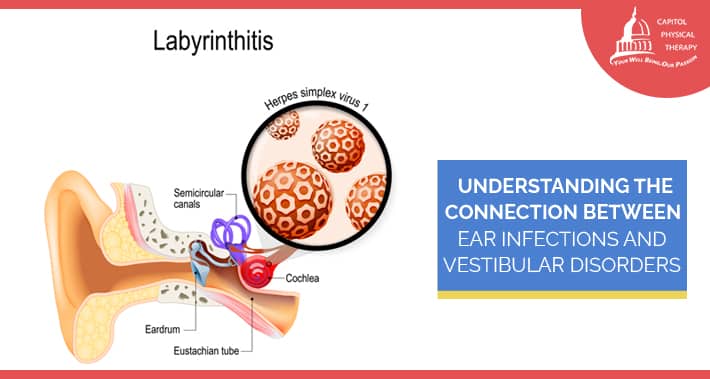
Have you been struggling with vertigo or dizziness?
Maybe you also get frequent ear infections and wonder if that’s why you’re having persistent problems with dizziness?
Both vestibular neuritis and ear infections can affect your vestibular system, which is a part of your inner ear.
Labyrinthitis is the name for ear infections of your inner ear.
It can affect both parts of your vestibular system, while vestibular neuritis affects only one part of it.
If you’re struggling with balance, dizziness, vertigo, or nausea, you could have a vestibular issue.
While these symptoms often resolve with time, it can be unsettling when they don’t.
That’s when a physical therapist experienced with treating vestibular issues can swoop in to help.
If you’re struggling with persistent symptoms due to vestibular neuritis or labyrinthitis ear infections, vestibular physical therapy for balance can help.
If you’ve never had physical therapy before, and have questions, take a look at our FAQ.
At Capitol Physical Therapy, we can help you with everything from carpal tunnel syndrome to increasing your libido during menopause.
Today, let’s take a look at how ear infections can affect your vestibular system.
What Is Your Vestibular System?
Inside your inner ear there are a series of tubes, or hollow channels, called your bony labyrinth.
There are three portions of the bony labyrinth.
First, the cochlear portion which sits in the front.
Then, the vestibule which sits in the middle.
And finally, the vestibular portion which sits in the rear.
Your vestibular system provides information to your brain about your movement.
It is a sensory system that primarily processes motion, head position, and spatial orientation.
Your vestibular system ensures that you can maintain your balance, keep your head stable, and maintain good posture, which helps you avoid developing spinal issues.
It also ensures that you remain stable as you move.
If you’ve ever wondered how you can keep your gaze on an object while you’re moving, for example, you have your vestibular system to thank.
What Is Vestibular Neuritis?
There is a nerve in your inner ear called the vestibulocochlear nerve.
Vestibular neuritis is a disorder that affects this nerve.
It is a very rare condition that only affects 4 out of every 100,000 people in America.
It’s also the third most common cause of peripheral vertigo, which affects your inner ear and causes balance challenges.
The vestibulocochlear nerve is responsible for sending information from the inner ear to your brain.
When this nerve is swollen or inflamed, the way the brain interprets this information is disrupted.
This makes it very hard for your brain to read the information that the vestibulocochlear nerve is sending.
Vestibular neuritis is considered a neurological condition, just like Parkinson’s disease, multiple sclerosis, or a stroke.
While vestibular neuritis can occur in people of all ages, it is rarely experienced by children and more often experienced by seniors.
As a result, if you’re receiving physical therapy for seniors, you may receive treatment for vestibular neuritis.
Vestibular Neuritis Symptoms
Vertigo is a symptom that can come on suddenly and severely if you have vestibular neuritis.
Vertigo is a spinning or swaying sensation that occurs even when you are still.
Dizziness, difficulty balancing, nausea, and vomiting are also symptoms of vestibular neuritis.
However, physical therapy treatments for vertigo are different than treatments for vestibular neuritis.
It is also possible to experience similar symptoms if you have a cervicogenic migraine, which can cause vertigo or dizziness.
You may also experience cognitive symptoms like difficulty concentrating due to debilitating dizziness.
The most severe symptoms of vestibular neuritis, such as the severe vertigo, usually only last a few days.
While this is not a long time, you may feel that the vertigo is very debilitating and disruptive toward your everyday life.
Usually you will start to feel better after those few days and recover completely after a several weeks, though this is not always the case.
Some people may continue to have issues with balance and dizziness with head movements after the initial few days.

How Are Ear Infections Linked With Vestibular Neuritis?
Ear infections are closely related to vestibular neuritis.
But “ear infection” isn’t just a single diagnosis .
In fact, there are a number of different types of ear infections.
Labyrinthitis, for example, is an infection of your inner ear.
Labyrinthitis creates swelling in both branches of the vestibulocochlear nerve.
On the other hand, vestibular neuritis involves swelling in only the vestibular portion of the nerve.
This kind of inner ear infection would cause swelling to the hearing portion of this nerve.
That means the symptoms of both vestibular neuritis and labyrinthitis mostly present the same.
However, with labyrinthitis you would have the additional symptom of hearing loss.
How Can A Vestibular Physical Therapist Help?
If you have balance issues and dizziness from vestibular neuritis that last longer than a few weeks, you may benefit from a vestibular physical therapy program.
The goal of these programs is to retrain your brain to adapt to balance shifts as you experience them.
Your brain may need to learn to use your other senses to compensate for the fault in your vestibular system.
Your physical therapist will provide you with a personalized evaluation to see what your unique needs are.
They will check your ability to follow movement with your eyes and test your balance as you move and stand still.
Testing your sensitivity to changing your posture is also common.
There are three main forms of treatment involved in vestibular physical therapy: habituation, gaze stabilization, and balance training.
Habituation will involve identifying what triggers your dizziness and repeatedly exposing you to those triggers.
Gaze stabilization exercises will help you keep your vision from bouncing around, giving you the increased stability you need.
Balance training for vestibular neuritis will involve using different visual and sensory cues to retrain your brain.
If you’re on the fence about how effective physical therapy is for vestibular neuritis, recent studies have shown that supervised physical therapy helped patients see a significant improvement in their dizziness and ability to walk.
These improvements were observed in a short period of time; just over one month.
Participants in the study who were not supervised by a physical therapist, but did exercises at home did not see as great an improvement in their symptoms.
Book Your Appointment With Capitol Physical Therapy Today
If you’re dealing with persistent symptoms from chronic symptoms of vestibular neuritis or labyrinthitis, you may be feeling frustrated and defeated.
Here at Capitol Physical Therapy, we are uniquely trained to help you get back to your former self.
We also offer telehealth physical therapy services to better accommodate your busy schedule.
Book your appointment with Capitol Physical Therapy today.
1331 H St NW #200,
Washington, DC 20005
- https://g.page/capitolptdc
9560 Pennsylvania Ave. # 202,
Upper Marlboro, MD 20772
- https://goo.gl/maps/zjL4NnnuThRhrcS86
Capitol Physical Therapy offers orthopedic and other pain related solutions, with our versitile team of physical therapists in Washington, DC